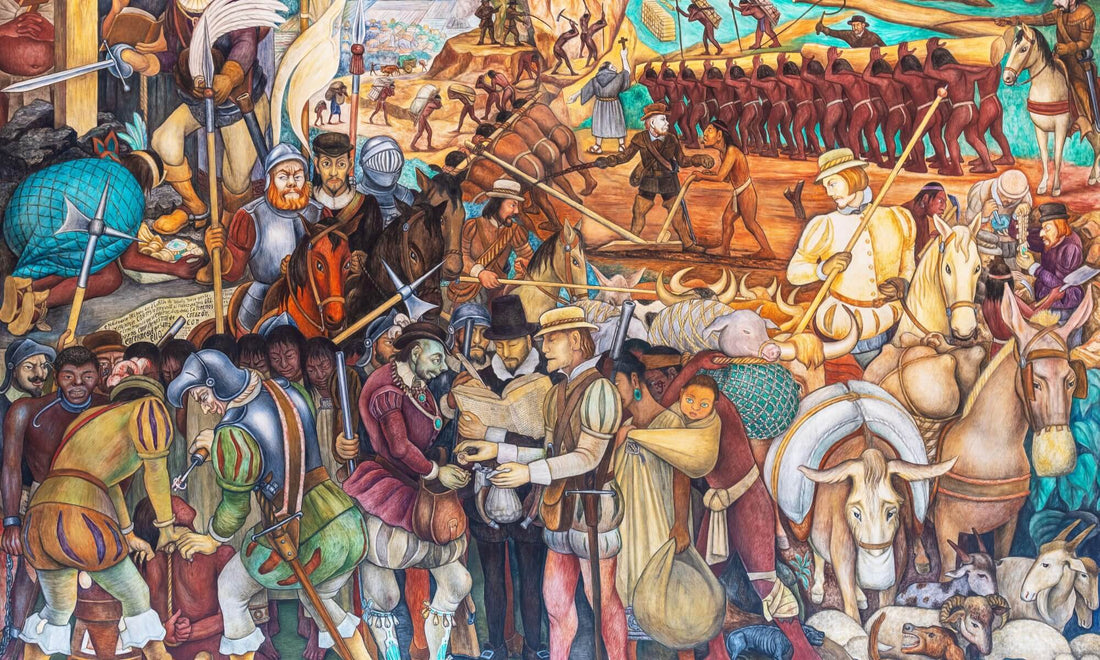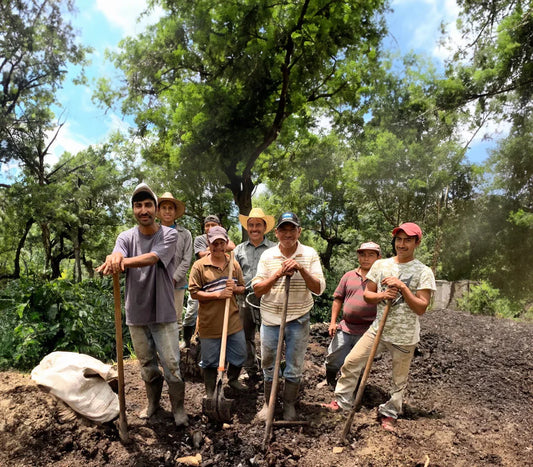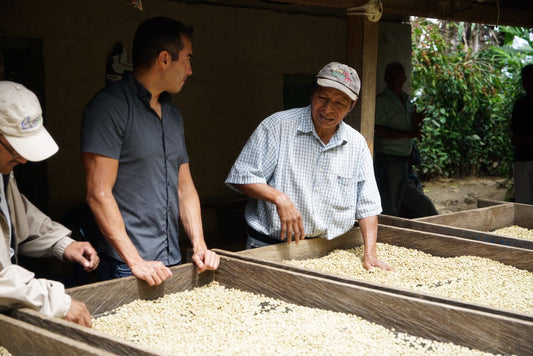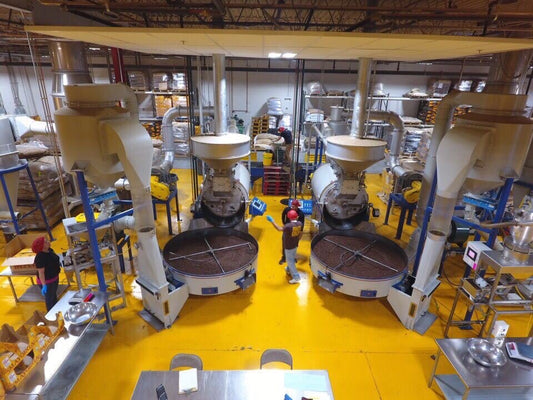
Coffee... An Industry Built on Colonialism and Slavery
Imagine you work in the car industry making components for the manufacturing of high-end cars.
Your customer, the wealthy car company, always pays you below your cost of manufacturing. They continuously demand that you use materials they sell to you above market. They offer you loans to buy those materials, hire workers, and run your facility. You guarantee that loan with your business and home and your interest rate is around 20%. They then market themselves as being “philanthropic” by giving the poor car part manufacturers a small donation to “help them out of poverty.”
Table of Contents
Does this sound ridiculous? It should. Yet let’s take a look at the coffee industry: it’s common practice for roasters and traders to donate part of their proceeds to non-profits or to “give back” to farmers to help them build schools and other desperately needed infrastructure or basic needs—all a result of manipulative practices that have put the farmers in a vicious cycle of poverty.
We should be ashamed to work in an industry where our suppliers do not earn enough to guarantee a decent quality of life for themselves and their families. Yet this is a well-recognized problem within the coffee industry. A subset of producers has been in debt and impoverished for generations. These farmers have limited access to the market and the system prevents many of them from improving their situation.
Across Latin America, chronic seasonal hunger is a problem, as is indebtedness. Many think it’s as simple as paying more for coffee. I agree that this is a massive component, but until we eradicate the predatory practices established by colonization and swept under the rug through marketing, paying more will simply make those abusers even more wealthy while giving producers a disproportionately low percentage of that increase.
In order to make a change, we need to understand what led to this.
Coffee's Colonial Roots
Coffee originated in Africa before making its way to Asia and Latin America. How did it travel so far? Through colonization and slave trade.

Large European-owned estates in Brazil and the Caribbean would use African slaves to farm immense amounts of coffee planted from stolen African seeds. In Central America, indigenous populations often worked the estates, after being forcefully evicted from their land and left with no choice but to labor for their oppressors.
Whether they were African slaves or subjugated indigenous populations, they lived hard lives. They were underfed, poorly treated, and disempowered. Many experienced violence or died simply due to the hardships of their work.
Over the years, the European populations continued to amass more and more power while local people became more and more vulnerable to them.
This is an ugly truth. However, it’s one we need to acknowledge. The impact of colonialism still exists today and, until we recognize that, we can’t change things.
Colonial Structures Affecting the Coffee Industry Today
Let’s take a look at some of the coffee farms you will find in Latin America:
First, you have the big estates, which are typically owned by a wealthy family or a multinational trader. Particularly in Brazil, these estates have become extremely good at efficient farming. They are mechanized, they work with strains that are much more productive and efficient, and they now have an extremely low cost of production. They tend to have their own mill and often buy coffee from other parts of the community. In short, they are financially strong with a business model that mirrors that of multinational traders. They have the financial means to control producers through lending, the provision of materials and they are also close to the market of roasters and importers. THEY ARE NOT POOR.
Then, you have wealthy farming families. Latin American countries tend to have their wealth concentrated in a small pocket of families. These families usually have their own farms, mills, and export companies. They tend to be descendants of Europeans who came to our countries to exploit our people centuries ago or select families who have amassed wealth through agriculture and influence. They (or their driver) will pick you up in their late model Toyota Prado, take you to nice lunches, and put you up in hotels that they or their family members own. THEY ARE NOT POOR.
You also have ex-pat farmers from the United States. Often, their parents grew up in Latin America, so they have loose roots in the country. However, when they come back to buy land, they bring with them a host of advantages: strong market access, good financing, and the ability to invest. As a result, they now have beautiful farms with quality coffees that they can sell for a premium while using the story of the poor farmer to garner support from consumers. They’re effectively competing and taking business from producers they claim to be supporting. THEY ARE NOT POOR.
And then you have the small, local farmers– the ones that, at Mayorga Coffee, we partner with. They are marginalized, selling to the same multinational companies that they have partnered with for generations because they don’t have any other choice. They tend to be indigenous and don’t have the funds, infrastructure, technology, logistics, or market access to leverage options to sell to others. These are the farmers experiencing seasonal hunger and struggling because of the complex web of abusive practices that exist in our supply chains—including but not limited to the price paid. They have to work together as cooperatives to be able to have export levels of volume and to have milling services provided (most of which is overpriced). THESE FARMERS ARE POOR!
The big estates, the wealthy farming families, and the ex-pat farmers are all able to survive—and even thrive—through these difficult times. They are able to do this because of inherited wealth and inherited contacts. They can “ride out” the downtimes using the resources amassed over generations, as well as through the times when costs get high.
The small farmers, however, have inherited an unequal power system that dates back to colonial days, and are still disadvantaged by a lack of market access. In my opinion, these farmers are worse off than they were when I started Mayorga over 20 years ago—because of all the new competition from the wealthier farmers. Meanwhile, consumers want to pay more to make an impact.
The Impact This Has On Coffee Farmers
Market exclusion and reduced resources hinder small, local farmers at every stage. Let’s take a look at one example: financing. (This, in fact, is the whole reason I started Mayorga Organics. I wanted to help a family friend avoid the finance trap).

Traditionally, a mill or an exporter offers a small, disempowered farmer a loan, knowing that they lack the capital and strong profit margins necessary to get financing from the bank. Part of the condition of offering that loan would be the right to buy all of the farmer’s coffee at less than the market value (in contrast to how, for example, a direct trade purchase would happen). The farmer, desperately in need of that loan for farm improvements, would say yes in order to get by another day.
However, that loan could come with astronomical interest rates. In my work across Latin America, I’ve encountered rates as high as 27%.
Perhaps that farmer needs that loan to buy fertilizer. Some mills will insist that the farmer buys the fertilizer through them – but when you look at the prices, they are up to five times the market rate.
So, the mills are profiting from the fertilizer sale, they are profiting from the interest payments, and they are profiting from buying coffee at below-market rates. Often, they are then able to sell this coffee at a good premium, thanks to its cup quality.
Few local farmers have the insight into the final green coffee prices to understand how inequitably they’re being treated. Partners of ours have told us, “This mill has helped us for generations. They helped our grandfather.” Yet when I asked what that help was, it turned out to be merely the high-interest loans, coffee purchases at low prices, and milling services that were overpriced and often exaggerated shrink rates in milling.
In the meantime, wealthier farmers, mills, and exporters who benefit from the heritage of colonialism run profitable businesses. Many of these businesses were established 300 years ago, and many of them continue to reenact the same power imbalances today. They’re the ones with the resources to curate coffees like Geshas and 90+ pt naturals. Poor farmers just don’t have the resources for these practices and frankly, the volume is minuscule.

This is why it is important that we make sure we work with small, local farmers. Our policy at Mayorga is we only work with producers who live and work on their farm, or with cooperatives made up of those individuals. We get to know them and their needs. We pay a price that correlates with the quality of their product and invest in programs that support their healthcare and their children’s education. We help them to diversify their income and then buy their alternative organic crops. In some countries like Costa Rica, El Salvador, and Guatemala we work with producers who are in the more “privileged” category, but we do so because they are focused on organic practices or work with surrounding producers to create a cooperative that brings those small producers into our supply chain.
As Maya Angelou famously said, “If you don’t know where you’ve come from, you don’t know where you’re going.”
I'm not writing this to blame anybody or to make excuses. However, I firmly believe that we cannot ignore the role of colonialism in coffee-growing countries if we hope to make lasting, meaningful changes. Moreover, we need to be careful to not repeat history by creating a new group of colonizers that seem friendlier and more well-intended in their marketing but are creating more distance between the truly poor farmer and the market.


